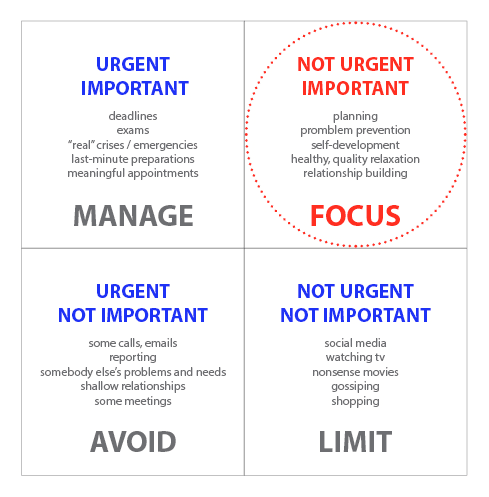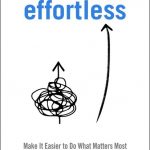“It is not enough to be busy. So are the ants. The question is: What are we busy about?” – Henry David Thoreau
The Big Rock Theory is a productivity concept popularized by author Dr. Stephen R. Covey. In his book First things First, Covey stated that the key to getting things done is not to prioritize your schedule but to schedule your priorities.
To live a more balanced existence, you have to recognize that not doing everything that comes along is okay. There’s no need to overextend yourself. All it takes is realizing that it’s all right to say no when necessary and then focus on your highest priorities.
He describes the big rock theory with this story:
One of our associates shared this experience:
I attended a seminar once where the instructor was lecturing on time. At one point, he said, “Okay, it’s time for a quiz.” He reached under the table and pulled out a wide-mouth gallon jar. He set it on the table next to a platter with some fist-sized rocks on it. “How many of these rocks do you think we can get in the jar?” he asked.
“After we made our guess, he said, “Okay. Let’s find out.” He set one rock in the jar . . . then another . . . then another. I don’t remember how many he got in, but he got the jar full. Then he asked, “Is that jar full?”
Everybody looked at the rocks and said, “Yes.”
Then he said, “Ahhh.” He reached under the table and pulled out a bucket of gravel. Then he dumped some gravel in and shook the jar and the gravel went in all the little spaces left by the big rocks. Then he grinned and said once more, “Is the jar full?”
By this time we were on to him. “Probably not,” we said.
“Good!” he replied. And he reached under the table and brought out a bucket of sand. He started dumping the sand in and it went in all the little spaces left by the rocks and the gravel. Once more he looked at us and said, “Is the jar full?”
“No!” we all roared.
“He said, “Good!” and he grabbed a pitcher of water and began to pour it in. He got something like a quart of water in that jar. Then he said, “Well, what’s the point?”
“The point is, no matter how full your schedule is, if you try really hard, you can always fit some more things into it!”
Somebody said, “Well, there are gaps, and if you really work at it, you can always fit more into your life.”
“No,” he said, “that’s not the point. The point is this: if you hadn’t put these big rocks in first, would you ever have gotten any of them in?”
“If you don’t put the big rocks in first, you’ll never get them in at all.”
“With the “more is better” paradigm, we’re always trying to fit more activities into the time we have. But what does it matter how much we do if what we’re doing isn’t what matters most?
The Big Rocks
If we endeavor to put in the big rocks first, they would be room for pebbles, sand, and water. But if we put the sand, pebble and water first, there won’t be room for the big rocks. The key to getting things done is to schedule and prioritize the big rocks in your life, such as Family, Medical checkups, writing or practice sessions.
The Big Rocks are the really important things of life such as your health, family and well meaning realtionships. Taking care of the big rocks of your life would make taking care of the pebbles, sand and water effortless.
- Family Time – Schedule and create time to spend with your family
- Doctor Appointments
- Writer – Stick to a routine for writing daily.
- Musician – Schedule time to rehearse and hone your talent.
The Pebbles
The pebbles are the other important things in your life but they are not as important as the big rocks. They include work, school, material posessions: your car and home. They also require nuturing but not to be given priority over the big rocks.
The Sand
The sand includes everything else, the small stuff, things you can do without; they really do not add much value in the long run. They include TV and news watching, Checking Social Media and E-mail intermittently, phone calls, constant pings on our phone, and the notifications that keep us distracted from getting things done daily.
“Learn how to separate the majors and the minors. A lot of people don’t do well simply because they major in minor things.” – Jim Rohn
If you focus your energy and time on the small things/trivialities (Sand) of life, there would never be room for the essential things in life (Big Rocks). So the key to becoming effective and getting things done is to focus on the important things first. Schedule/set your priorities; the rest is just pebble and sand.
Take care of the important rocks first, set your priorities and execute relentlessly.

As a motivational speaker and author, Jim Rohn, noted, “A lot of people don’t do well simply because they major in minor things.”. We do not get goals, dreams, and aspirations achieved because we major in minor things. We pick up all phone calls when our phones ring; we check our phone notifications repeatedly and multitask without getting anything done.
According to a report from mobile data and analytics firm App Annie, global consumers are now spending an average of 4.2 hours per day using apps on their smartphones, an increase of 30% from just two years prior. In some markets, the average is even higher — more than five hours.
We confuse motion for movement, activity for accomplishment; we are busy doing nothing. As American essayist and philosopher Henry David Thoreau once quipped, “It is not enough to be busy. So are the ants. The question is: What are we busy about?”. We focus on the pebbles and sand in our life while ignoring the big rocks. We slave our youth and adult life to make money and spend our old age caring for our health we spend our youth working hard to enjoy.
So young people pay good money to get tattoos removed that teenagers paid good money to get. Middle-aged people rushed to divorce people who young adults rushed to marry. Older adults work hard to lose what middle-aged adults worked hard to gain. On and on and on. –Daniel Gilbert, Harvard Psychologist
We focus on gossip partners disguised as friends, frenemies disguised as family members, users disguised as bosses, narcissists disguised as spouses, rivals disguised as siblings. It is not easy seeing through the mental fog and the emotional blackmail of our so-called friends, families, and relationships because emotions, indebtedness, and guilt blind us. We spend our energy going all out for people; we use our finite time here on earth to nurture destructive, toxic, and harmful relationships. We fail to distinguish who is who: Ask yourself, is this person a big rock, a pebble, or sand? Knowing each person’s place would allow you to know the relationship to nurture or let go.
Your time here is limited; spending it on activities, relationships, and things that are not high-yielding is not worth it. So ask yourself: Is this activity or relationship a big rock, pebble, or sand?
All the Best in your quest to get Better. Don’t Settle: Live with Passion.



1 Comment
Pingback: You are already naked. – Lanre Dahunsi